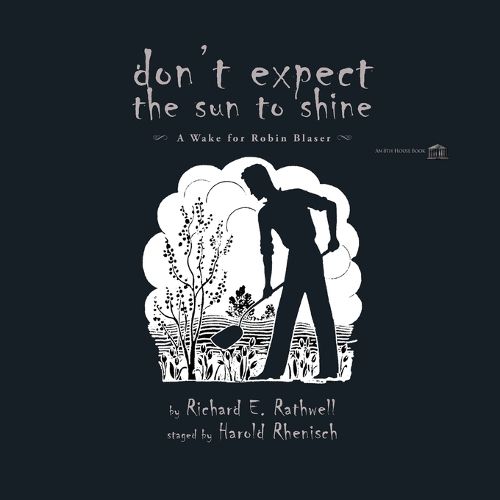Readings Newsletter
Become a Readings Member to make your shopping experience even easier.
Sign in or sign up for free!
You’re not far away from qualifying for FREE standard shipping within Australia
You’ve qualified for FREE standard shipping within Australia
The cart is loading…






This title is printed to order. This book may have been self-published. If so, we cannot guarantee the quality of the content. In the main most books will have gone through the editing process however some may not. We therefore suggest that you be aware of this before ordering this book. If in doubt check either the author or publisher’s details as we are unable to accept any returns unless they are faulty. Please contact us if you have any questions.
Authors Richard Rathwell and Harold Rhenisch offer a new perspective on the works of the late American-Canadian poet Robin Blaser, who taught a generation of Canadian poets the techniques of blowing apart meaning, deriving significance from the arrangement of text on the page, and using pages as cloud chamber bowls. "Don't Expect the Sun to Shine: A Wake for Robin Blaser" is a record of the wake held in Blaser's honor, offering readers an opportunity to wander through the literary landscape he's left behind.
These were called poems, but they were really scripts to tease the cognitive patterns of biological readers. Unlike book-based poetry, they did not interact with the technological constraints of books but with the neurological constraints of humans. Their purpose was to turn space into time. Their purpose was to stop death. Every poem was a wake.
In Don't Expect the Sun to Shine, Rathwell and Rhenisch turn time back into space, creating an opportunity for readers to wander around freely and meet the biological history that controls their hike. As Rhenisch notes, "We want readers to wander around wherever they like. We don't control their hike. Their biological history does that. We are just hosting a party, so they can meet."
Don't Expect the Sun to Shine responds to three ongoing trends in the development of written language in the age of images: the treatment of words as images in art writing, the evolution of criticism as a form of creativity that fails its potential because it remains enslaved to the academy, and the contemporary world of narrative fiction, which sees fictional worlds as the greatest truths, enjoys being dominated by normative narratives, and treats characters as clothing taken on for public display.
Novels have become self-help, identity racks in a mall that you page through to find the one that fits. Then you wear it. - Harold Rhenisch
A fitting tribute to Robin Blaser, his life's work, and his influence on Canadian poetry. "Don't Expect the Sun to Shine: A Wake for Robin Blaser" is a must-read for poetry enthusiasts and those interested in the intersection of literature and art.
$9.00 standard shipping within Australia
FREE standard shipping within Australia for orders over $100.00
Express & International shipping calculated at checkout
This title is printed to order. This book may have been self-published. If so, we cannot guarantee the quality of the content. In the main most books will have gone through the editing process however some may not. We therefore suggest that you be aware of this before ordering this book. If in doubt check either the author or publisher’s details as we are unable to accept any returns unless they are faulty. Please contact us if you have any questions.
Authors Richard Rathwell and Harold Rhenisch offer a new perspective on the works of the late American-Canadian poet Robin Blaser, who taught a generation of Canadian poets the techniques of blowing apart meaning, deriving significance from the arrangement of text on the page, and using pages as cloud chamber bowls. "Don't Expect the Sun to Shine: A Wake for Robin Blaser" is a record of the wake held in Blaser's honor, offering readers an opportunity to wander through the literary landscape he's left behind.
These were called poems, but they were really scripts to tease the cognitive patterns of biological readers. Unlike book-based poetry, they did not interact with the technological constraints of books but with the neurological constraints of humans. Their purpose was to turn space into time. Their purpose was to stop death. Every poem was a wake.
In Don't Expect the Sun to Shine, Rathwell and Rhenisch turn time back into space, creating an opportunity for readers to wander around freely and meet the biological history that controls their hike. As Rhenisch notes, "We want readers to wander around wherever they like. We don't control their hike. Their biological history does that. We are just hosting a party, so they can meet."
Don't Expect the Sun to Shine responds to three ongoing trends in the development of written language in the age of images: the treatment of words as images in art writing, the evolution of criticism as a form of creativity that fails its potential because it remains enslaved to the academy, and the contemporary world of narrative fiction, which sees fictional worlds as the greatest truths, enjoys being dominated by normative narratives, and treats characters as clothing taken on for public display.
Novels have become self-help, identity racks in a mall that you page through to find the one that fits. Then you wear it. - Harold Rhenisch
A fitting tribute to Robin Blaser, his life's work, and his influence on Canadian poetry. "Don't Expect the Sun to Shine: A Wake for Robin Blaser" is a must-read for poetry enthusiasts and those interested in the intersection of literature and art.